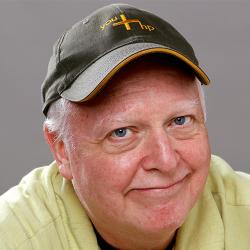Jukebox musicals, those sonic salutes to deceased chart-toppers from yesteryear, are always dependable audience-getters around these parts. Buddy: The Buddy Holly Story has been getting steadily revived, for instance (Cortland Repertory did it over the summer), and Always. . . Patsy Cline always seems to find its way back to the floorboards, while local companies have also embraced semi-satires of the 1960s rock era, such as Forever Plaid and The Marvelous Wonderettes. Hank Williams: Lost Highway, the season finale at Auburn’s Merry-Go-Round Playhouse, certainly has many toe-tapping moments, which is what one would expect from the late country singer’s catalog (think “Jambalaya” and “Hey Good Lookin’”). Such upbeat hits help leaven the more downbeat grace notes that plagued Williams’ too-short life.
Indeed, Lost Highway opens with radio headlines declaring that Williams has just dropped dead at age 29 on New Year’s Day, 1953, as key characters yet to be fully introduced to the audience reel in disbelief and grief. The presence of Williams himself (incarnated by Peter Oyloe) doesn’t quite believe it, either; he’s now a ghost (albeit dressed in Williams’ standard white suit) and silently prowls about the stage, surveying their reactions. Specters of death often haunt the jukebox musical genre, although this motif is presented with more nuance in Lost Highway.
The play’s book, penned by Mark Harelik and Randal Myler, features characters who offer their first-person perspectives on Williams’ life. Mama Lilly Williams (Kristine Zbornik), kind of a stage-door mom, describes pushing her talented son (played as a youth by Reed Chronis) to inevitable stardom. Early on, the writers also reveal that the singer suffered from frequent back pain, thus foreshadowing the plot element regarding the dangers of mixing medication and moonshine.
The pivotal character of Tee-Tot (Tim Cain), a backwoods bluesman who shows Hank how to craft a meaningful tune, mostly addresses the audience with his powerful singing: He opens both acts with spirituals, a narrative device that focuses on Williams’ musical roots. In another early moment Williams plays his new song, a Woody Guthrie-esque knockoff titled “WPA Blues,” for Tee-Tot. But Tee-Tot dismisses the ditty as phony because Hank never dealt with relief checks or the Works Progress Administration. The bluesman instead suggests that Williams should sing about his own experiences, thus paving the way for country classics like “I’m So Lonesome I Could Cry.”
Other supporting characters offer more down-home storytelling. Fred Rose a.k.a. Pap (George Wendt), Williams’ manager/father figure, guides the young man’s career all the way to the Grand Ole Opry, but Pap is unable to save Williams from alcoholism. Apparent golddigger and wanna-be songbird Audrey (LilyAnn Carlson), dubbed “a woman of consequence” by Pap and renamed “Tawdry” by an unimpressed Mama Lilly, nevertheless enchants Hank and soon becomes his wife, although her off-key screeching is a liability that will force her off the touring playbill.
The most interesting character on the periphery is an unnamed waitress (Katie Bruestle), who is seen at odd moments throughout the play as she toils behind a greasy spoon’s counter. The hash slinger, a die-hard Williams fan, has her dream come true when he drunkenly walks into the diner and whisks her away for a strange evening of moonlight and cow manure.
Lost Highway might lack the overall ebullience of Buddy, as authors Harelik and Myler (the latter an old hand with this genre, having written jukebox musicals devoted to Janis Joplin and the Mamas and the Papas) delve into Williams’ demons, albeit not too deeply. Their biographical liberties and streamlining of events might perturb purists, yet for those who are only familiar with the 1964 Hank Williams movie biopic Your Cheatin’ Heart, still the high point of George Hamilton’s acting career (no Zorro the Gay Blade jokes, please), there are plenty of pleasures that drive Lost Highway to its finish line.
For starters, expect a lot of laughs.
Director Hans Friedrichs and his performers extract the comedic utmost from pantomime, such as perching cast members on chairs to feign being crammed into a car as Mama Lilly sternly drives Williams and his band to honky-tonk gigs throughout Alabama. There’s also some cornball shtick during a Grand Ole Opry bit with Williams’ cohorts (played by Kent M. Lewis, Christopher Kent and Keith Potts) that features jokes presumably older than the price tag on Minnie Pearl’s hat.
Also expect a lot of heart. Lost Highway could have been mounted on an intimate scale, although a smaller space would have robbed this production of its terrific set designed by David Arsenault, flanked with billboards and telephone poles, and featuring a painted backdrop of railroad ties that seem to stretch to infinity—or at least to Aurelius. Yet the emotions always ring true, especially when the ladies take center stage: Kristine Zbornik avoids the maternal clichés as Mama Lilly, LilyAnn Carlson conjures welcome empathy as wife Audrey and Katie Bruestle shines as a straight-shootin’ fangirl.
As Pap, Cheers sitcom barfly George Wendt lends his considerable marquee value to this Merry-Go-Round finale. Wendt has always been a dependable supporting actor reminiscent of longago Warner Bros. contract players like Frank McHugh—guys who knew how to nail their roles with a brisk, no-nonsense authority.
Wendt happily blends into the MGR ensemble’s comfort zone to support this production’s other major drawing card: Peter Oyloe, whose knockout interpretation of Hank Williams is about as good as it gets. Oyloe, who has tackled the role in Chicago and Cincinnati mountings, captures the vitality and vulnerability of a young entertainer who was not quite ready for the rigors of stardom, but he’s also solid at replicating the Hank Williams style, right down to those classic yodels.
Even for Yankee theatergoers at Owasco Lake, hillbilly music never sounded this authentic.



